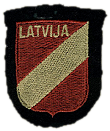The SS plot to rule the worldLatvian "Waffen-SS" weren't mobilized for Eastern Front combat?
The majority of historians have explained SS recruitment strategy as an expediency that fatally compromised the elite status of the militarised SS. The most recent history of the SS by Adrian Weale asserts: "In 1940, [the Waffen-SS] had legitimately been able to claim that it was an elite ... 2by June 1944 ... in no military sense could [the bulk of the organisation's combat units] ever be described as a corps d'elite." This is the latest reformulation of a view that has been 1repeated ad nauseum by most historians of the SS. In short, they argue, Himmler simply needed bodies in SS uniforms to hurl at the advancing Soviet armies. It was a numbers game — a necessary evil.
In book I propose a different explanation. The recruitment of non-Germans not only complied with Nazi-sponsored race theory as it evolved during the course of the war, but was a vital component in a master plan hatched up by secretive SS "think tanks". Himmler was despised by many of the Nazi elite as an obsequious and petty-minded bureaucrat — a judgement echoed by many modern historians. This was a 3sham. Himmler's imagination was secretive, lethal and boundless. His covert master plan was to build a German empire dominated not by Hitler and the Nazi Party (NSDAP), but the SS.
As we read this passage in context below, keep in mind, Hale indicates virtually unanimous agreement among military historians of the Waffen-SS.
2“by June 1944 ... in no military sense could [the bulk of the organisation's combat units] ever be described as a corps d'elite.' This is the latest reformulation of a view that has been 1repeated ad nauseum by most historians of the SS. In short, they argue, Himmler simply needed bodies in SS uniforms to hurl at the advancing Soviet armies. It was a numbers game — a necessary evil.
In book I propose a different explanation.”
Hale makes it clear that his book is not about history, scholarship, or viewpoints. It is about a personal agenda. If it were true that the Nazis only needed individuals to fight against the Red Army on the Eastern Front, that being "against" the USSR did not mean being "for" Nazi Germany, then all we are left with is Hale's open admission, at the outset, that his role here is not one of historian.
Whether Himmler was a petty bureaucrat or evil genius has no bearing on the military role of the Waffen-SS on the Eastern Front. But Himmler is essential to Hale's subsequent assigning of motivations. Hale ignores the clear consensus of historians to perpetrate his own naked sham.
Hale dismisses the conclusions of historians, preferring his own SS conspiracy theory. From a socio-political standpoint, the SS were certainly the carriers and protectors of the sacred ideals of national socialism. But, as historians rightly point out, that "SS" had nothing to do philosophically or operationally with the "Waffen-SS" which served under the Wehrmacht, and which the Germans sent in as cannon fodder on the Eastern Front.
Far from joining in some sort of privileged Aryan Nazi elite, Latvian units were:
- ill-equipped, insufficiently armed, often running out of ammunition;
- had no decent uniforms—indeed, they slogged through snow drifts and swamps wearing boots with holes in them;
- were left defenceless when German artillery refused to fire on Red Army positions because they did not want to reveal their own position;
- and were sent in as cannon fodder to substitute for German units when it became known the Russians were about to launch a major offensive.
Hale ignores historical facts to link the Waffen-SS to Himmler's personal goals and aspirations, opening the door to ascribe the ideology and crimes of the Allgemeine SS to the eastern Waffen-SS combat units the Germans created later in WWII.
That Latvians earned more Iron Crosses for bravery and were the most effective foreign Waffen-SS unit speaks not of loyalty to Nazism but of the same loyalty that brought independence to Latvia a scant quarter century earlier as from a boat docked in Liepāja, holding no territory themselves, Latvians battled back to drive out both Russians—with German assistance, backed by the Western Powers—and then the Germans. And of the same tenacity which empowered Latvian culture to survive and flourish on the Baltic Sea ever since the Egyptians erected their first obelisk.
